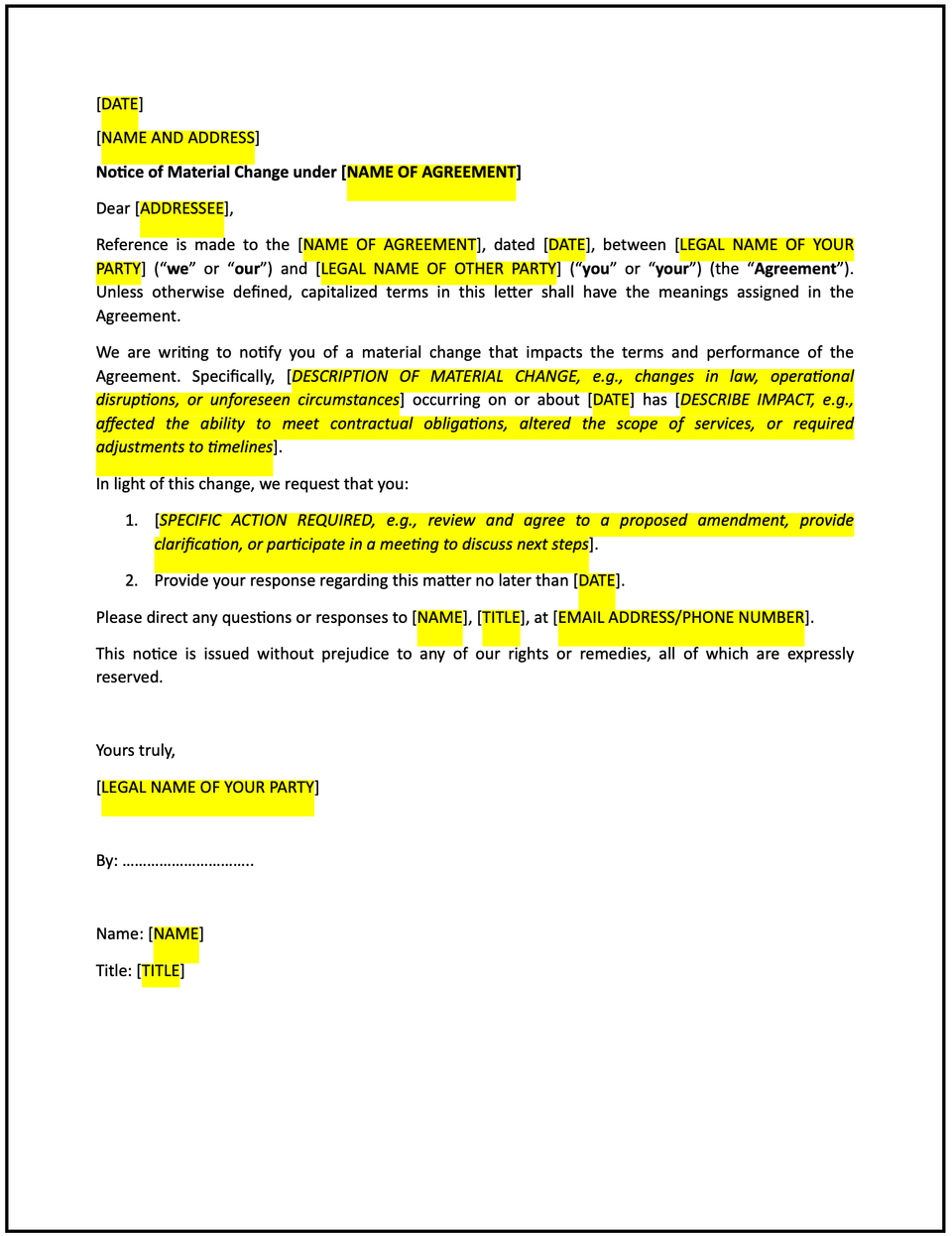Letter of material change under a contract: Free template

Letter of material change under a contract
A material change under a contract can significantly impact the terms, responsibilities, or performance of the agreement. This letter provides a professional way to notify the other party of the change, explain its implications, and propose steps to address the situation while maintaining transparency and collaboration.
How to use this letter of material change under a contract
- Reference the contract: Clearly identify the contract, including its title, reference number, and the parties involved. Provide context by referencing relevant clauses, if applicable.
- Describe the material change: Clearly outline the nature of the change, including what has changed, when it occurred, and why it qualifies as a material change.
- Explain the impact: Detail how the change affects the contract’s terms, obligations, or performance. Include specific examples if necessary.
- Propose a resolution: Suggest potential adjustments, renegotiations, or alternative arrangements to address the material change.
- Maintain a professional tone: Ensure the letter is respectful and focused on collaboration to preserve the business relationship.
- Request acknowledgment: Ask the other party to confirm receipt of the letter and provide input or agreement on the proposed steps.
Benefits of using a letter of material change under a contract
This letter template provides a clear and professional way to address material changes in a contract while maintaining collaboration and accountability. Here’s how it helps:
- Maintain transparency: Proactively notifying the other party of the change demonstrates accountability and fosters trust.
- Clarify implications: Clearly outlining the impact of the change ensures all parties remain aligned and prepared to address it.
- Propose solutions: Suggesting adjustments or renegotiations emphasizes your commitment to resolving the issue constructively.
- Minimize disputes: Addressing the change professionally reduces the risk of misunderstandings or conflicts.
- Provide documentation: The letter serves as a formal record of the material change and your efforts to address it, which can be useful for future reference.
Tips for writing an effective letter of material change under a contract
- Be specific: Clearly reference the contract and describe the material change, including relevant details for context.
- Explain the impact: Provide a concise explanation of how the change affects the agreement or the parties’ obligations.
- Propose solutions: Suggest actionable steps to address the change and minimize disruptions.
- Use professional language: Maintain a respectful and solution-oriented tone, emphasizing collaboration and mutual understanding.
- Keep it concise: Focus on the key points and avoid unnecessary details or commentary.
Frequently asked questions (FAQs)
Q: What qualifies as a material change under a contract?
A: A material change is a significant alteration to the terms, obligations, or conditions of the contract that affects its performance or enforceability.
Q: Should I include evidence of the material change?
A: Yes, providing documentation such as updated terms, notices, or supporting evidence helps clarify the situation and supports your notification.
Q: Who typically receives this letter?
A: Send the letter to the other party or parties involved in the contract, typically their legal or operational representatives.
Q: How formal should this letter be?
A: The tone should be professional and respectful, reflecting the seriousness of addressing the material change.
Q: When should this letter be sent?
A: Send the letter as soon as the material change is identified to address the issue promptly and minimize its impact.
Q: Can this letter propose renegotiation of the contract?
A: Yes, if the material change significantly impacts the agreement, you can propose renegotiation to realign the terms.
Q: Is this letter suitable for ongoing changes?
A: Yes, the letter can address both one-time and ongoing material changes that affect the contract.
This article contains general legal information and does not contain legal advice. Cobrief is not a law firm or a substitute for an attorney or law firm. The law is complex and changes often. For legal advice, please ask a lawyer.


